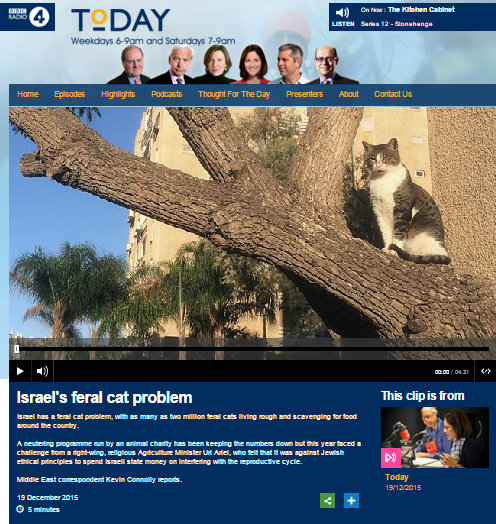If blessed with a long memory, listeners to the December 19th edition of BBC Radio 4’s ‘Today’ programme might have concluded that Kevin Connolly has spent so long at the corporation’s Jerusalem bureau that he has simply run out of fresh stories to tell. After all, barely three years have passed since Connolly last devoted one of his reports to the subject of street cats in Israel – “The lairy, wary cats stalking Jerusalem bins“, 18 October 2012.
However, those listening to the item (from 01:20:00 here and promoted separately in abridged version here and a filmed version here) would quickly have understood the intent behind Connolly’s purported feline-interest report – which actually relates to a story over a month and a half old. The synopsis to the abridged version reads:
“Israel has a feral cat problem, with as many as two million feral cats living rough and scavenging for food around the country.
A neutering programme run by an animal charity has been keeping the numbers down but this year faced a challenge from a right-wing, religious Agriculture Minister Uri Ariel, who felt that it was against Jewish ethical principles to spend Israeli state money on interfering with the reproductive cycle.”
Presenter Mishal Husain’s introduction to the item was as follows:
“For decades Israel has had a problem with feral cats. There are an estimated 2 million of them on the streets. A neutering programme run by an animal charity has been keeping the numbers down but this year it faced a challenge from a right-wing minister who said it was against Jewish ethics to spend state money on interfering with the reproductive cycle. For now the charity has won the argument so our correspondent Kevin Connolly went to see it at work.”
In the report itself Connolly inaccurately tells listeners that the charity-run neutering programme is “controversial” in Israel.
“For the cats the neutering clinic offers a brief respite of cleanliness and care. But in Israel its work is suddenly controversial.”
He goes on:
“The religious right-wing agriculture minister Uri Ariel has tried to direct state funding away from the programme, arguing that a prohibition in Judaism on interfering with the Almighty’s preferred arrangements for reproduction applies to animals as well as humans.”
Later he says:
“At one point the Agriculture Ministry was talking about transferring them [street cats] to other countries – although without saying where or how. A little internet mockery has put paid to that idea – at least for now.”
In fact it was not “the Agriculture Ministry” which proposed that idea but the same minister in a letter to his opposite number at the Ministry for Environmental Protection and what Connolly does not adequately clarify to listeners is that Ariel’s outlandish ideas were quickly shot down by the public, animal welfare activists, lawmakers and the attorney general, meaning that the story he now tells is long since irrelevant.
Nevertheless, that did not prevent Connolly from resurrecting it over a month and a half later even though British listeners to this report would not have learned anything about methods of catching, neutering and releasing street cats which does not also happen in their own country. But of course the real subject matter of this item is not the cats: they are merely the hook for the promotion of a story about a “right-wing, religious” politician in one of the BBC’s ‘Israeli Jews behaving weirdly’ stories.
Radio 4 listeners also heard Connolly imply that Israelis like to blame the British for their problems:
“And if you’re British and you’re waiting to hear how this problem in the Middle East is somehow your fault – keep listening.”
An interviewee then says:
“The legend in Israel is that there was a rat problem and that the British brought cats to Israel to take care of the rats and now we have no rat problem and we have many, many cats.”
As those listeners with a long memory may have recalled, Connolly promoted that same theme three years ago in his previous cat story.
“There are plenty of feral cats elsewhere in the Middle East too but the great thing about being a citizen of a former colonial power is that almost any problem you ask about can somehow be traced back directly to your national door.
So there is a theory that the feline population of Jerusalem began to expand when the city was under British rule between the wars when cats were introduced to control rats.”
Apparently this kind of non-story is what the audiences of a media outlet which has apparently lost interest in reporting terror attacks against civilians and serially avoids touchy subjects such as internal Palestinian politics or the situation of minorities living under PA and Hamas rule must come to expect.




